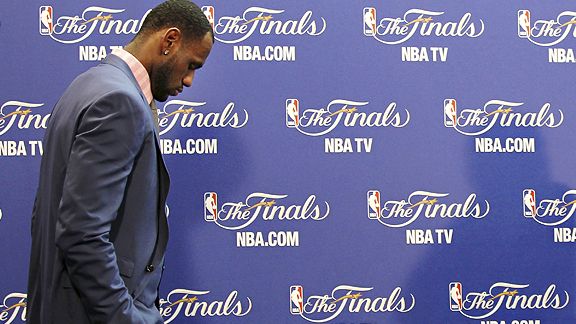 Ronald Martinez/Getty Image
Ronald Martinez/Getty ImageLeBron James has a lot to think about this summer after vanishing in the NBA Finals.
MIAMI -- LeBron James was not himself in Game 6, or for that matter, the entire NBA Finals. But his skills and physical talents didn’t suddenly abandon him, so we’re left trying to explain his disappearing act on the big stage.
We can’t get inside LeBron’s thoughts, but there appears to be a mental roadblock that has prevented him from asserting himself on the basketball court. We have absolutely no idea what it’s like to be a 26-year-old and absorb the hatred of millions from around the world. We have no clue what’s it’s like to make millions of dollars at the age of 18 because of an elite ability to put a round ball through an iron ring.
We don’t have the slightest clue what it is like to be LeBron. We cannot relate, no matter how many layup lines you’ve participated in on a court or how many times you’ve shot hoops at the local YMCA. To echo Hubie Brown in a recent TrueHoop TV episode, “Who are we to break down [LeBron] from a psychological standpoint?” We are not brain experts (although I did minor in psychology in college!) and, as hard as it may be for some, we should refrain from engaging in armchair psychology.
But as we debate about LeBron’s psyche, I can’t help thinking about Mark Cuban, the guy who just beat LeBron to the Larry O’Brien Trophy. Always looking to be on the cutting edge of sports management, the owner of the Dallas Mavericks hired Don Kalkstein, a sports psychologist, to work full-time with the team in 2007. After he let Kalkstein go, at former Dallas coach Avery Johnson’s request, Cuban rehired him in 2010 to help maximize the physical talents of his squad.
Cuban is big on psychology. Speaking at the 2011 MIT Sloan Analytics conference in April, Cuban declared psychology the next frontier when it comes to player evaluation, saying he puts just as much weight in psychological evaluations as the statistical ones (even if they do overlap). Cuban made an investment a few years ago in the brains of basketball players, and now he’s jetting around the United States with a championship trophy.
Teams have always done their homework on their potential assets, spending countless hours analyzing a player’s every move and dissecting every second of their on-court performance. But the focus has always been on the physical, not on the mental. That’s the dark spot of player development: what goes on upstairs.
What makes players tick? What makes them freeze up? How does a player become a leader? How much thinking is too much?
These are all important questions in the wake of LeBron’s stunning disappearance in the Finals. Speaking after Tuesday’s exit interviews with the team, LeBron shed light on what caused his disappointing play. His answer? Self-imposed pressure.
“I put a lot of pressure on myself not to let my teammates down,” LeBron said. “At the end of the day, that’s what it’s all about for me. Maybe to a fault at times, I put so much pressure on myself.”
This is a mental problem, not a physical one. As Brian Windhorst reports, James has dealt with sports psychologists over the years, but we don’t know how much interaction he’s had with one in Miami. Whatever he has been doing with his emotional and mental stability, figuring out how to rise above the pressures -- self-inflicted or not -- and get back to being LeBron when his team needs LeBron.
There’s a stigma about seeking the help of a psychologist. In a world in which we ask players to be mega-macho superheroes, some see it as a sign of weakness -- that James can’t handle his own problems himself. But really, there’s no difference between seeing a psychologist and meeting with a coach at the gym to get some shots up. If it improves the ability to do his job, then it’s worth his while.
Embedding a sports psychologist in an NBA team isn’t anything new. One general manager I spoke with estimates that half the league employs a psychologist on their staff. As far as I can tell, the Heat are not among them.
But the Heat would be wise to make sure their best player can perform like one when they need it most. Finding a psychologist, someone they can trust and, perhaps more importantly, whom LeBron trusts, will be a tough task. But with all the outside distractions, the hatred deployed from the fans and the desire to appease everyone around him, LeBron has a lot on his plate -- even if the fans don’t want to hear about it. Admitting he needs some help in that capacity certainly won’t be the easiest offseason assignment on LeBron’s to-do list, but for the Heat, it may be for the best.
